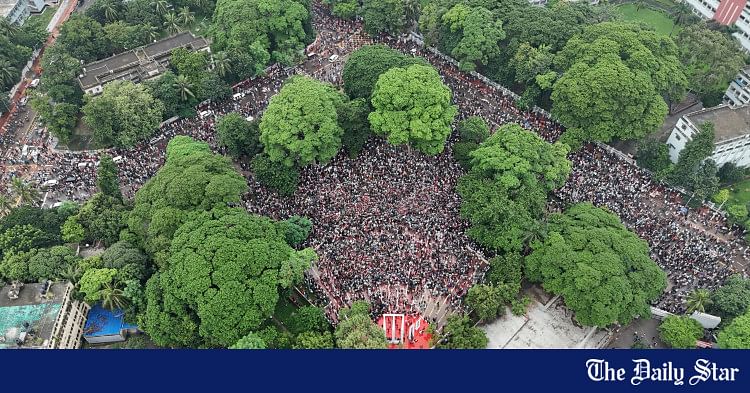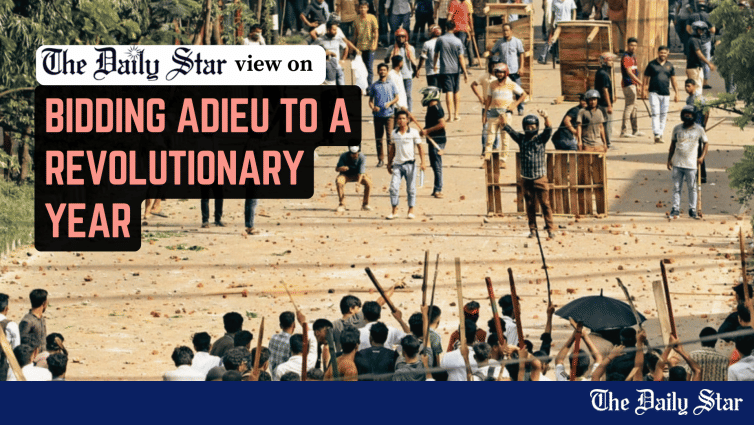Saif
Senior Operative
- 13,277
- 7,271
- Origin

- Axis Group

Date of Event:
Jan 1, 2025
Challenges and priorities for 2025

Macroeconomic management will remain a formidable challenge for Bangladesh in the coming year. Containing inflation, bolstering foreign exchange reserves and dealing with overstretched banks will be critical priorities. Many financial institutions are grappling with liquidity crises, operational inefficiencies, and weakened public confidence, necessitating decisive interventions to restore stability in the banking sector.
Despite making a commitment not to provide liquidity support to ailing banks by printing money, the central bank had to backtrack. If such a measure has to be repeated, policy credibility will be called into question, let alone the objective of tackling inflation with a contractionary monetary policy.
Prolonged inflationary pressure for more than two years now has eroded purchasing power, intensifying socioeconomic vulnerabilities. If the most recent official poverty incidence data from the BBS Household Income and Expenditure Survey (HIES) 2022 acts as the benchmark, it can be estimated that, accounting for both rising price levels and nominal wage increases, nearly 7.9 million additional individuals have been pushed into poverty over the past two years. Furthermore, the size of the vulnerable population -- defined as those living above the poverty line but by no more than 25 per cent of it -- has increased by approximately 10 million.
Undoubtedly, the misgovernance of the previous regime has brought us to this dire situation, leaving people desperately seeking relief. A clear policy direction on expanding social protection support for the poor and vulnerable is still lacking.
It is with this backdrop that Ramadan will be a litmus test for the government's ability to stabilise prices effectively. While protecting the most vulnerable remains a priority, the middle class also expects robust measures to counter potential price hikes during the month of fasting for Muslims.
How to improve the supply side to complement contractionary approaches in addressing inflation remains largely a subject of discussion, with little concrete action apart from lowering import taxes on essential items. This alone cannot check prices during Ramadan.
Improving revenue mobilisation constitutes another urgent issue. Without significant progress in this area, the already limited fiscal space will shrink further, potentially jeopardising macroeconomic stabilisation efforts. Weak revenue collection, widespread corruption and persistent reform inertia have long been entrenched in fiscal management. Compounding these issues are slowing economic activities, sluggish import growth -- partly driven by the reserve crisis -- and inflation-induced reductions in purchasing power, all of which have adversely affected government revenue sources.
The preparation of the next national budget may prove to be a formidable task. Questions surrounding past GDP data and other information in national income accounting pose serious challenges to reconciling discrepancies and delivering a credible budget with clear policy directions.
There are also other fundamental budgetary challenges. Can the government avoid inflating social protection spending figures while reallocating resources to critical social sectors such as education and health? Given weak government revenue collection, how can public spending be managed without excessive reliance on borrowing from both domestic and external sources?
Under the interim government, the public expects responsible, innovative and accountable approaches to budget preparation and fiscal management. In line with the spirit of the July movement, it is imperative to link revenue collection and government expenditure to the broader goal of addressing growing inequality.
Global trade and geopolitical uncertainty are most likely to be additional external challenges. Tariff wars involving China, the US and EU are already a major concern for the world economy. The return of Donald Trump to office is likely to heighten trade conflicts, affect trade and investment flows and complicate the task of macroeconomic management. Combined with inflation and weak foreign reserves, such dynamics would further hinder Bangladesh's macroeconomic stabilisation.
So, the new year should mark the beginning of tangible and effectively implemented reform measures. Decisive action in this area is crucial to restoring public trust. Establishing reform commissions and gathering their recommendations are relatively straightforward tasks. However, the government, and as a nation, we must urgently address a far more critical question: why previous reform efforts failed and what will ensure their success this time.
The author is an economist and chairman of Research and Policy Integration for Development.
Macroeconomic management will remain a formidable challenge for Bangladesh in the coming year. Containing inflation, bolstering foreign exchange reserves and dealing with overstretched banks will be critical priorities. Many financial institutions are grappling with liquidity crises, operational inefficiencies, and weakened public confidence, necessitating decisive interventions to restore stability in the banking sector.
Despite making a commitment not to provide liquidity support to ailing banks by printing money, the central bank had to backtrack. If such a measure has to be repeated, policy credibility will be called into question, let alone the objective of tackling inflation with a contractionary monetary policy.
Prolonged inflationary pressure for more than two years now has eroded purchasing power, intensifying socioeconomic vulnerabilities. If the most recent official poverty incidence data from the BBS Household Income and Expenditure Survey (HIES) 2022 acts as the benchmark, it can be estimated that, accounting for both rising price levels and nominal wage increases, nearly 7.9 million additional individuals have been pushed into poverty over the past two years. Furthermore, the size of the vulnerable population -- defined as those living above the poverty line but by no more than 25 per cent of it -- has increased by approximately 10 million.
Undoubtedly, the misgovernance of the previous regime has brought us to this dire situation, leaving people desperately seeking relief. A clear policy direction on expanding social protection support for the poor and vulnerable is still lacking.
It is with this backdrop that Ramadan will be a litmus test for the government's ability to stabilise prices effectively. While protecting the most vulnerable remains a priority, the middle class also expects robust measures to counter potential price hikes during the month of fasting for Muslims.
How to improve the supply side to complement contractionary approaches in addressing inflation remains largely a subject of discussion, with little concrete action apart from lowering import taxes on essential items. This alone cannot check prices during Ramadan.
Improving revenue mobilisation constitutes another urgent issue. Without significant progress in this area, the already limited fiscal space will shrink further, potentially jeopardising macroeconomic stabilisation efforts. Weak revenue collection, widespread corruption and persistent reform inertia have long been entrenched in fiscal management. Compounding these issues are slowing economic activities, sluggish import growth -- partly driven by the reserve crisis -- and inflation-induced reductions in purchasing power, all of which have adversely affected government revenue sources.
The preparation of the next national budget may prove to be a formidable task. Questions surrounding past GDP data and other information in national income accounting pose serious challenges to reconciling discrepancies and delivering a credible budget with clear policy directions.
There are also other fundamental budgetary challenges. Can the government avoid inflating social protection spending figures while reallocating resources to critical social sectors such as education and health? Given weak government revenue collection, how can public spending be managed without excessive reliance on borrowing from both domestic and external sources?
Under the interim government, the public expects responsible, innovative and accountable approaches to budget preparation and fiscal management. In line with the spirit of the July movement, it is imperative to link revenue collection and government expenditure to the broader goal of addressing growing inequality.
Global trade and geopolitical uncertainty are most likely to be additional external challenges. Tariff wars involving China, the US and EU are already a major concern for the world economy. The return of Donald Trump to office is likely to heighten trade conflicts, affect trade and investment flows and complicate the task of macroeconomic management. Combined with inflation and weak foreign reserves, such dynamics would further hinder Bangladesh's macroeconomic stabilisation.
So, the new year should mark the beginning of tangible and effectively implemented reform measures. Decisive action in this area is crucial to restoring public trust. Establishing reform commissions and gathering their recommendations are relatively straightforward tasks. However, the government, and as a nation, we must urgently address a far more critical question: why previous reform efforts failed and what will ensure their success this time.
The author is an economist and chairman of Research and Policy Integration for Development.









